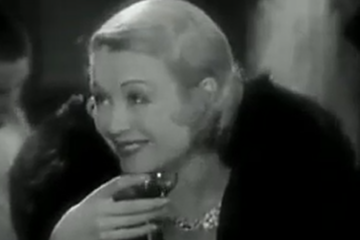Proof That It’s Pre-Code
- The very second shot of the film is Loretta Young in lingerie. They didn’t mess around back then!
- Single motherhood, child abuse, cheating the legal system, marital infidelity…
- “The trick is getting him to make love. And the wrong kind of making love.”
- Oh, and Cary Grant in a rare non-comedic role.
The thrill of revisiting films over eight decades old is that you get to see old stories back when they were seen as exciting and daring. The plot of Born to Be Bad could come from a Lifetime Original, but the stars and direction show just how many thrills you could get out this standby plot.
Loretta Young plays a very single mom, insomuch that she spends every night at the bar whining and dining a successive series of men who may even be referred to as clients, if you get my drift. Loretta has a boy named Mickey back at home, and he’s a little rapscallion. He lies, cheats, and steals, but he’s cute doing it, which I guess it what counts in most situations.
This works to both of their benefits when Mickey, after playing around out in the street, is accidentally run over by a deliver truck. That truck happens to be driven that day by the owner of the dairy, played Cary Grant glowering with a sexual intensity that he’d ditch in a decade or so for a more easy going charm.
Young has a big pair of baby doll eyes that she uses and abuses regularly. Tossing off lines like, “Truth and honor? What good did that ever do me?”, Young plays the typical Pre-Code bad girl with a good amount of relish and an even healthier amount of madness.
Not content to just get a settlement, she concocts an entire scheme that results in a played out courtroom battle against Grant. Unfortunately, her son wasn’t properly instructed that if you, you know, are playing a cripple in court, you shouldn’t go out roller skating between sessions. Seeing some footage of this indiscretion, Mickey is taken away from Young who goes off the deep end.
Things complicate and reverse. Grant’s married, but Young sets her eyes on getting him, either by gun or criminally abusing those big eyes. Grant resists as best he can, telling Young, “You’re bad, bad, bad, bad. You’re just a beautiful bad girl.” Well, imagine his surprise when telling her that doesn’t dissuade her in her attempts to seduce him.
As tawdry as this all sounds, the film itself plays this up to the be the pinnacle of respectable melodrama. Even after Grant has his affair to remember, he’s a strong, devoted man. He tells his wife about what has happened, and it turns out she’s pretty okay with it. Grant’s always wanted a kid, and she’s not able to provide like Young can. Oh, and she also admits that “Almost any woman can get any man your way. The cheap way.”
Born to Be Bad is about sacrifice, and knowing when you’re bad for someone. Young turns out to be bad for just about everyone, and her gradual realization is wonderfully shown. There may not be a lot of surprises around every corner, but it’s a film that fully invests itself to its characters. As an early example in the Lifetime genre, Born To Be Bad is an effective reminder that some things are better done the first time.


